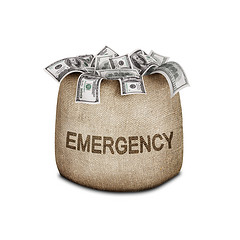A solid emergency fund is the base of any successful financial plan. However, many households don’t understand how to set up a proper emergency fund. This can get them in real trouble when they face a surprise expense. Before you start putting money aside for long-term goals like retirement and college expenses, you should make sure you’ve saved up a proper emergency fund. This will make sure an unexpected problem won’t derail your other financial goals.
Point of a Family Emergency Fund

The point of an emergency fund is to provide you with extra cash when you hit an expense that wasn’t part of your planned budget. This can happen when you lose your job when something breaks in your house or car, or when you get hit with medical bills. Households that don’t have an emergency fund need to turn to expensive sources of money like credit cards and payday loans when they have cash flow problems. This wastes money that could have been used for other financial goals. By setting up an emergency fund beforehand, you’ll be prepared for the worst and won’t have to pay out extra fees to handle a surprise expense.
Size of Your Family Emergency Fund
Your emergency fund should be enough to pay three to six months of your necessary household living expenses. Keep in mind that this is three to six months of your living expenses, not three to six months of your income. Your emergency fund only needs to cover expenses that are absolutely necessary during a financial emergency. These are expenses that you need to pay each month like your home costs, your bills, your groceries, and your health insurance. Other costs that you can postpone don’t need to be included. These are expenses like vacations, home renovations, and retirement savings.
Whether your emergency fund should be closer to three months or six months depends on a few factors. First, you should look at the number of paychecks coming into your household. If all your income comes from one job, you should have an emergency fund closer to six months as losing your job would completely cut off your income. If your household earns more than one paycheck, either you work two jobs or your spouse also works, you can plan closer to three months. You should also have a larger emergency fund if your monthly income is uncertain. Commission salespeople and self-employed business owners need larger emergency funds because they risk having low-income months. Lastly, if you have children, you should plan for a larger emergency fund.
Emergency Fund Account
It is critical that you keep your emergency fund in an account that is both liquid and stable in value. Liquid means your money is easy to access. When your car breaks down, you need money right away. If it takes weeks to cash out your emergency fund, it won’t do you much good. Generally, you should keep your emergency fund in checking accounts, saving accounts, and short-term money market accounts or CDs. All these accounts let you cash out your money quickly so they are liquid.
Your emergency fund should also keep a steady value. It’s not a good idea to your emergency fund in accounts that fluctuate, like the stock market. While stocks have a better long-run return than bank accounts, they sometimes drop in value. If you need to tap into your emergency fund during a market downturn, you could find yourself short on funds. Bank accounts, CDs, and money market accounts can’t lose money so they are ideal for an emergency fund.
Benjamin Franklin once wrote, “A stitch in time saves nine.” This quote perfectly describes the point of an emergency fund. By making this small investment ahead of time, you’ll be prepared for life’s road bumps so they won’t damage your financial plan.
Photo credit: 401(K) 2012
